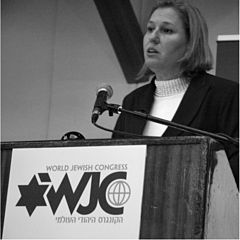israel moves to ban gender-segregation in public spaces
Israeli Justice Minister, Tzipi Livni, has announced the drafting of legislation that will outlaw all gender-based segregation in public spaces. ‘Today, I instructed the Justice Ministry to draft legislation … that will make any segregation of women and their humiliation in a public space a criminal offense,’ Livni posted on her Facebook account.
The proposed legislation is aimed at ending segregation in numerous fields, including public transportation, broadcasting, and public ceremonies. Gender segregation is a long-standing issue in Israel, especially within Haredi, or ultra-Orthodox, religious communities. In these areas, signs that advise women to dress modestly are commonplace and verbal abuse of those who don’t conform is a regular occurrence.
Until 2011, women were also required to sit at the back of buses travelling through these ultra-Orthodox communities. Legislation passed in that year allowed men and women to sit separately, but only if done voluntarily. Despite the law, however, segregation often continued in practice.
Advice from Israel’s Attorney-General prior to Livni’s announcement suggests that the new legislation will go further, removing separate seating in buses and requiring all passengers to enter through the front door. The legislation will also require radio stations to employ female broadcasters, and it will end segregation at public events, including funerals.
Segregation of women at government events received significant publicity in 2011, when Dr Channa Maayan, a recipient of an Israeli Health Ministry award was forced to sit separately from her husband at the ceremony and told a male must accept the award on her behalf as women were forbidden from the stage.
The issue of entrenched, religious, gender segregation is at the heart of an ongoing struggle within Israel over its national and social identity. Tensions between Orthodox and non-Orthodox Israelis have been growing markedly in recent years as the country attempts to overcome the paradoxes and inconsistencies that accompany its aim to be both a Jewish as well as a modern, liberal, democracy.
Orthodox Jews remain a minority, albeit a large and growing one, but exercise significant authority over many aspects of life. According to Israeli law, all matters of personal status, including births, deaths, marriages, and divorces, fall under the religious authority of the Chief Rabbinate, regardless of faith.
Opposition to the extent of the Rabbinate’s authority has led to protests from secular and non-Orthodox Israelis who argue that a variety of religious and secular views should be included. The legal authority of the Chief Rabbinate has also led to many Israelis choosing to marry outside the country in order to circumvent religious restrictions on inter-faith or secular marriages.
Although they do not comprise a homogeneous group, the Haredim are the most socially and religiously conservative of Orthodox Jews. Haredi communities enforce strict gender segregation and dress codes and maintain a separate educational system. Haredi men are regularly granted exemptions from otherwise compulsory national or military service, and due to low workforce participation (under 50% for both males and females) and generally large families, many are dependent on government assistance.
The influence of ultra-Orthodox politicians has been reduced by their exclusion from Israel’s current coalition government and it appears likely that Prime Minister Benjamin Netanyahu will continuing pushing to increase educational and workplace integration and to reduce military service exemptions and government subsidies for Haredi Jews.
These legislative changes and attempts to end segregation have incensed many ultra-Orthodox Israelis who see them as a direct attack on their way of life. As a result, religious militancy within these communities appears to be increasing. As covered in Lip last week, a recent attempt by the liberal Jewish group Women of the Wall to pray at the Western Wall wearing traditional male prayer shawls sparked angry protests from a large group of Haredi Jews.
Although widely supported, the proposed anti-segregation laws are likely to see tensions continue to rise between the ultra-Orthodox groups and the mainstream Israeli population as the debate continues over Israel’s identity.
By Toby Newton


